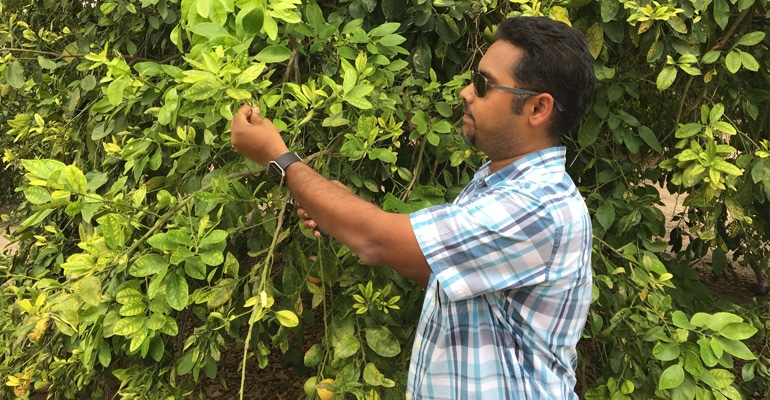August 2, 2018

A Texas A&M AgriLife Research scientist at Weslaco will lead a consortium of researchers in major citrus fruit producing regions to conduct high-throughput screening in discovering antimicrobials that could prevent citrus greening.
Citrus greening, also known as Huanglongbing disease, has devastated citrus fruit crops in Florida and has made its way to Texas and California. The research grant of approximately $1.2 million was awarded by the U.S. Department of Agriculture-National Institute of Food and Agriculture, Emergency Citrus Disease Research and Extension.
“In this project, we are implementing an innovative pilot-scale antimicrobial screening and discovery pipeline to help find therapies to control citrus greening,” said Dr. Kranthi Mandadi, assistant professor in the plant pathology and microbiology department, AgriLife Research at Weslaco. “We’ve brought together teams of interdisciplinary faculty with expertise in engineering, computational biology, genomics, genetics, pathology and extension to identify small molecules and antimicrobials that block virulence proteins of the pathogen causing citrus greening.”
“This collaborative research is addressing a major economic issue affecting citrus growers in Florida, Texas and California,” said Dr. Bill McCutchen, executive associate director of AgriLife Research in College Station. “We are hopeful that new high throughput screening process will lead to multiple discoveries to mitigate the threat of citrus greening and other hard to detect pathogens and diseases while enhancing quality and yields.”
“With citrus greening disease, and with many other related plant diseases, a major challenge is the pathogens that cause them are unculturable,” Mandadi said. “This stymied our ability to test new therapies that are effective against these pathogens. A key aspect of our project is that we are utilizing an innovative approach to cultivate these pathogens in so called ‘hairy roots’ which enables faster bioassays in the lab.”
Currently, several antimicrobials are being utilized or tested against citrus greening including antibiotics, defense modulators and zinkicides. To evaluate their efficacy, the conventional approach is to perform foliar or leaf sprays, injections, soil drenching or to screen against other distant surrogate pathogens that can be cultured. However, the screening and effectiveness by these approaches can be inconsistent and costly when trying to work with mature trees, thus limiting the ability of researchers to screen the vast number of chemistries that exist. Using the hairy root-based bioassays, the screening of antimicrobials (small molecules and peptides) against the pathogens can be performed in vitro much faster, thus saving significant amounts of resources and time, which the citrus industry is running short on.
“The idea is to couple the hairy root screening platform with the latest genomic and computational modeling tools to discover antimicrobials directly blocking citrus greening pathogen proteins and deliver them in a much shorter time-frame,” McCutchen said. “Such target-based screening approach, common in biomedical drug discovery, hasn’t been employed much for tackling plant disease. Once shortlisted, potent antimicrobials will be considered for greenhouse and field tree evaluations.”
Mandadi is joined by several project collaborators and citrus industry stakeholders. They include Dr. San Sandun Fernando, professor, Texas A&M biological and agricultural engineering, Texas A&M; Dr. Veronica Ancona, assistant professor with the Texas A&M-Kingsville Citrus Center; Dr. Gitta Coaker, professor, University of California; Dr. Elizabeth Grafton-Cardwell, director of Lindcove REC & Research Entomologist, UC Riverside Agriculture Natural Resource Lindcove Research and Extension Center; Dr. William Dawson, professor, University of Florida Citrus Center, Dr. Stephen Futch, extension agent IV, University of Florida Citrus Research and Education Center, Mike Irey, director of research and business development, Southern Gardens Citrus, Florida.
About the Author(s)
You May Also Like




